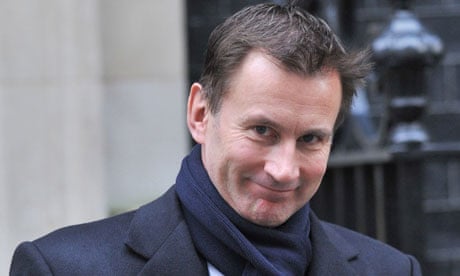Patients will be able to see their medical details online under plans for a "paperless NHS" in which digital records will be shared at the touch of a few buttons between all parts of the health and social care services, from ambulance workers to hospital consultants to care homes for elderly people.
Jeremy Hunt, the health secretary will launch the project on Wednesday alongside a report claiming it could save nearly £5bn a year, after the costs are taken into account. He said it should also improve patient care and save lives.
"More importantly [than money] it can save billions of hours of time so nurses can spend more time with patients if they are not behind the nurses station trying to fill out forms," Hunt said. "And I think it can save thousands of lives. A lot of the safety problems in the NHS – people being prescribed with the wrong medication, and 'never events' where people have the wrong arm amputated – it's wrong to say technology is the panacea but it can make a big, big difference."
The multibillion-pound scheme will raise concerns about a repeat of the fiasco over the NHS database, set up by the previous, Labour government and scrapped by the coalition in 2011 after more than £6bn of public money had been spent.
It will also spark fears about how patients' records are kept private, an issue that has dogged all major public service IT projects, especially after details of 25 million people claiming child benefit were lost by HM Revenue & Customs in 2007.
Nick Pickles, director of the privacy campaign group Big Brother Watch, said: "Paperless records is a nice soundbite but the change creates significant privacy risks. There is a real risk that if patients aren't assured that this scheme is fully secure then people will stop sharing information with their doctor and that could be extremely dangerous for care."
Hunt will attempt to reassure critics by stressing that the plan, first flagged up in the NHS mandate last year, is significantly different to the junked Labour scheme Connect for Health, which was originally announced in 2001.
Unlike the Labour scheme, under which the Department of Health in Whitehall attempted to design a national database and ask five different organisations to build it, the current government will set out national standards for different IT systems to "talk to each other", but allow more than 200 clinical commissioning groups of GPs who will take charge of patient care from April to design and purchase their own programmes.
Hunt noted that NHS staff and patients were more tech savvy than a decade ago, with two-thirds of people banking online, for example. "If banks can develop systems where people are confident about their money, it must be possible for the NHS to develop systems where people are confident about their privacy," he said. "But we need to earn the public's trust on this."
The health secretary will publish an ambitious timetable for implementing the plan: in 2014 he wants hospitals and GPs to be able to access and update GP records, by 2015 all patients should be able to see their own records online, and by 2018 the aim is for every part of the NHS and social care to be connected. Private companies could "potentially" be included.
"The vision I'm thinking of is an ambulance driver answering a 999 call should be able to look up a patient's medical record on their way to their home, so they'll find out the person they are going to see is a diabetic who had two falls last year, who has a heart condition," he said.
He pledged that individual patients would be able to continue using paper or opt out of the new digital-sharing system. "You absolutely have to have a process in place for people who don't want that [data sharing] to happen," Hunt said.
Last May the Department of Health published an impact assessment on early plans for digital records, which estimated that at a basic level, over 10 years, they would cost £1.2bn to implement and save more than £6.3bn, including savings to patients' time and improved quality of life from earlier diagnosis and treatment of problems – a net saving of just over £5bn. Costs would be shared about equally between central government and local organisations, officials suggested.
A report from the consultants PWC published on Wednesday will say that if much fuller digital plans are put in place, including innovations such as text alerts to patients of negative test results, another £4.4bn a year could be saved after costs, although the report does not spell out those costs.
